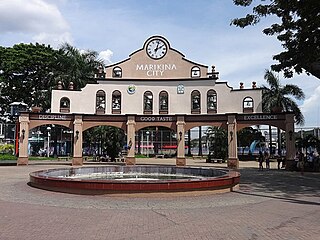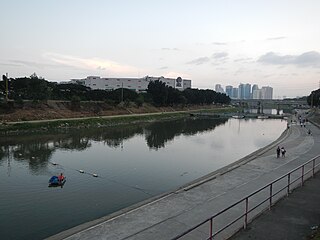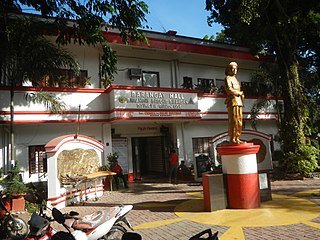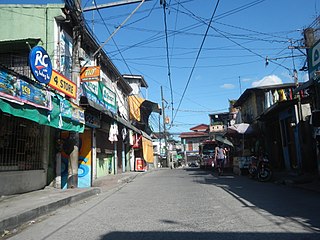
Rizal, officially the Province of Rizal, is a province in the Philippines located in the Calabarzon region in Luzon. Its capital is the city of Antipolo. It is about 16 kilometers (9.9 mi) east of Manila. The province is named after José Rizal, one of the main national heroes of the Philippines. It is bordered by Metro Manila to the west, Bulacan to the north, Quezon to the east and Laguna to the southeast. The province also lies on the northern shores of Laguna de Bay, the largest lake in the country. Rizal is a mountainous province perched on the western slopes of the southern portion of the Sierra Madre mountain range.

Quezon City, also known as the City of Quezon and Q.C., is the most populous city in the Philippines. According to the 2020 census, it has a population of 2,960,048 people. It was founded on October 12, 1939, and was named after Manuel L. Quezon, the second president of the Philippines.

Rodriguez, officially the Municipality of Rodriguez, is a 1st class urban municipality in the province of Rizal, Philippines. According to the 2020 census, it has a population of 443,954 people making it the most populous municipality in the country. Pending an affirmation through plebiscite, Republic Act No. 11812 repealed Batas Pambansa Blg. 275 and intend to revert to its original municipal name Montalban.

Pasig, officially the City of Pasig, is a highly urbanized city in the National Capital Region of the Philippines. According to the 2020 census, it has a population of 803,159 people.

Marikina, officially the City of Marikina, is a 1st class highly urbanized city in the National Capital Region of the Philippines. According to the 2020 census, it has a population of 456,159 people.

Caloocan, officially the City of Caloocan, is a 1st class highly urbanized city in Metro Manila, Philippines. According to the 2020 census, it has a population of 1,661,584 people making it the fourth-most populous city in the Philippines.

San Mateo, officially the Municipality of San Mateo, is a 1st class urban municipality in the province of Rizal, Philippines. According to the 2020 census, it has a population of 273,306.

The Marikina River is a river in eastern Metro Manila, Philippines. It is the largest tributary of the Pasig River, with headwaters located in the Sierra Madre Mountains in Rodriguez, Rizal province.

Bagong Silangan is a barangay located in the 2nd district of Quezon City, Philippines. Nearby barangays are Commonwealth, Batasan Hills and Payatas. Separated by a river in the east, the barangay leads to the Municipality of San Mateo in the province of Rizal.

Barangka is an administrative division of Marikina, Metro Manila, the Philippines. It is an urban barangay part of the 1st district of Marikina and is one of the oldest barangays in Marikina.

Batasan Hills is a barangay of Quezon City, Philippines. The barangay was originally planned as the National Government Center of the Philippines. The Batasang Pambansa Complex, which sits atop the Constitution Hill, is the legislative session hall of the House of Representatives of the Philippines. The Sandiganbayan, a special appellate court, is also located here.

Payatas is an administrative division in eastern Metro Manila, the Philippines. It is an urban barangay located in the 2nd district of Quezon City adjacent to the barangays of Commonwealth, Batasan Hills and Bagong Silangan.

The Upper Marikina River Basin Protected Landscape is a protected area in the Province of Rizal in the Philippines, which forms the upper area of the drainage basin of the Marikina River.

Bagong Pag-asa, also known as the Magsaysay District, is an administrative division in eastern Metro Manila. It is an urban barangay of Quezon City with low-density housing and is known for its shopping malls, transport hubs and office buildings.

Marikina's 2nd congressional district is one of the two congressional districts of the Philippines in the city of Marikina. It has been represented in the House of Representatives of the Philippines since 2007. The district was created in 2006 following the passage of Republic Act No. 9364 which amended the 1996 Marikina City Charter. It consists of the northern Marikina barangays of Concepcion Uno, Concepcion Dos, Fortune, Marikina Heights, Parang, Nangka and Tumana bordering Antipolo, Cainta, Quezon City, and San Mateo. It is currently represented in the 19th Congress by Stella Quimbo of the Liberal Party (LP).

Tatalon is a barangay of Quezon City, Philippines. According to 2020 Census, it has a population of 55,404 people.
Frost Plan was the popular name for the Plan of Quezon City, co-authored by Juan M. Arellano and Harry Frost, together with Alpheus Williams and Louis Croft. The plan was approved in 1941, two years after the creation of Quezon City. The Plan was revised in 1949.

The Quezon City Council is Quezon City's Sangguniang Panlungsod or legislature. It is composed of 36 councilors, with 6 councilors elected from Quezon City's six councilor districts and two councilors elected from the ranks of barangay (neighborhood) chairmen and the Sangguniang Kabataan. The presiding officer of the council is the Vice Mayor, who is elected citywide.





















